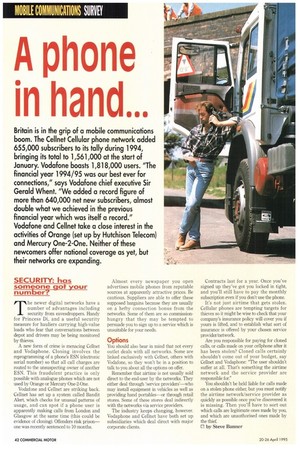A phone in hand...
Page 44

If you've noticed an error in this article please click here to report it so we can fix it.
Britain is in the grip of a mobile communications boom. The Cellnet Cellular phone network added 655,000 subscribers to its tally during 1994, bringing its total to 1,561,000 at the start of January. Vodafone boasts 1,818,000 users. "The financial year 1994/95 was our best ever for connections," says Vodafone chief executive Sir Gerald Whent. "We added a record figure of more than 640,000 net new subscribers, almost double what we achieved in the previous financial year which was itself a record." Vodafone and Cellnet take a close interest in the activities of Orange (set up by Hutchison Telecom) and Mercury One-2-One. Neither of these newcomers offer national coverage as yet, but their networks are expanding.
SECURITY: has someone got your number?
The newer digital networks have a number of advantages including security from eavesdroppers. Handy for Princess Di, and a useful security measure for hauliers carrying high-value loads who fear that conversations between depot and drivers may be being monitored by thieves.
A new form of crime is menacing Cellnet and Vodaphone. Cloning involves the reprogramming of a phone's ESN (electronic serial number) so that all call charges are routed to the unsuspecting owner of another ESN. This fraudulent practice is only possible with analogue phones which are not used by Orange or Mercury One-2-One.
Vodafone and Cellnet are striking back. Cellnet has set up a system called Bandit Alert, which checks for unusual patterns of usage, and can spot if a phone user is apparently making calls from London and Glasgow at the same time (this could be evidence of cloning). Offenders risk prison— one was recently sentenced to 10 months. Almost every newspaper you open advertises mobile phones from reputable sources at apparently attractive prices. Be cautious. Suppliers are able to offer these supposed bargains because they are usually on a hefty connection bonus from the networks. Some of them are so commissionhungry that they may be tempted to persuade you to sign up to a service which is unsuitable for your needs.
Options
You should also bear in mind that not every outlet deals with all networks. Some are linked exclusively with Cellnet, others with Vodafone, so they won't be in a position to talk to you about all the options on offer.
Remember that airtime is not usually sold direct to the end-user by the networks. They either deal through 'service providers'—who may install equipment in vehicles as well as providing hand portables—or through retail stores. Some of these stores deal indirectly with the networks via service providers.
The industry keeps changing, however. Vodaphone and Cellnet have both set up subsidiaries which deal direct with major corporate clients. Contracts last for a year. Once you've signed up they've got you locked in tight, and you'll still have to pay the monthly subscription even if you don't use the phone.
It's not just airtime that gets stolen. Cellular phones are tempting targets for thieves so it might be wise to check that your company's insurance policy will cover you if yours is lifted, and to establish what sort of insurance is offered by your chosen service provider/network.
Are you responsible for paying for cloned calls, or calls made on your cellphone after it has been stolen? Cloned calls certainly shouldn't come out of your budget, say Cellnet and Vodaphone: "The user shouldn't suffer at all. That's something the airtime network and the service provider are responsible for."
You shouldn't be held liable for calls made on a stolen phone either, but you must notify the airtime network/service provider as quickly as possible once you've discovered it is missing. Then you'll have to sort out which calls are legitimate ones made by you, and which are unauthorised ones made by the thief.
by Steve Banner




























































































